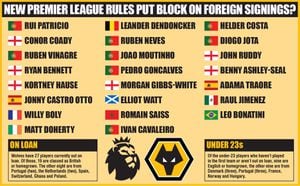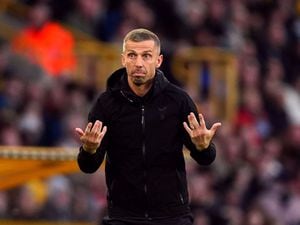Wolves' league of nations – could Brexit have an impact?
When listing the consequences of Brexit, the economy, jobs and the Irish border may spring to mind, not Premier League football.
But if the Football Association gets its way, the landscape of the most popular league in world football will be changed forever post-Brexit – and Wolves would be impacted too.
The FA has spotted an opportunity to boost the number of English players in the league (currently at a lowly 30 per cent) and therefore increase the amount of top talents playing at the highest level for the England manager to choose from.
This has been an ongoing problem for about 20 years and explains why current boss Gareth Southgate has to pick players who aren’t playing (the likes of Ruben Loftus-Cheek and Fabian Delph, at Chelsea and Manchester City respectively, can’t get in their teams due to foreign stars being ahead of them), or who even play in the Championship, like Derby’s Mason Mount.
A proposal was discussed by clubs this week, put forward by the FA, which would see the number of overseas players in each 25-man Premier League squad restricted to 12. It was rejected on Thursday but the FA is likely to persevere.
The current rules say no more than 17 foreigners must be in a squad – and many, like the aforementioned Man City and Chelsea, use the maximum amount.
But how would it impact on our own Wolverhampton Wanderers? Well, Nuno Espirito Santo’s squad has 12 overseas players, so that’s right on the limit.
Look through the list of players who feature week after week and you’ll find more than 12, but current rules state that players aged 21 and under (like Ruben Neves) are exempt and don’t have to be named in the squad.
And while clubs have to have eight home-grown players in their 25-man squads, those players don’t necessarily have to English – they just need to have spent three seasons in England before the age of 21.
In theory, then, no problem for Wolves if the FA’s proposal came into force today. But the number of English, British and home-grown players in the Wolves ranks has decreased dramatically in the past few years and that trend looks like continuing.

Of the 34 players Wolves fielded in the 2015/16 season, the club’s last before Fosun took charge in a £30million takeover, only six weren’t either British or homegrown.
Of the 23 used so far this season, just seven are classed as British or homegrown.
Therefore in just three years their percentage of foreign and non-homegrown players used has risen from 18 per cent to 70 per cent.
The reasons behind this? Well, English players tend to cost far more than their overseas equivalents. A young English star commands a higher fee because he is a rarity.
If a 23-year-old English winger had played twice for his country and featured in the Champions League, a likely fee would be at least £20m, but the Portuguese Ivan Cavaleiro ticked both those boxes and cost Wolves just £7m. He is one of nine Portuguese players to play for Wolves in the past two years, with the team under the Portuguese management of Nuno and his backroom team.
Fosun’s business model is to invest in young talent and increase their value considerably to bolster the club’s assets. Buying English players at an inflated price wouldn’t fit that model.
Instead Wolves are looking to produce their own talents via their academy, but as Under-23 boss Rob Edwards recently admitted, it will be very hard for youngsters to break into a team that’s vying to be in the top half of the Premier League. Stafford-born Morgan Gibbs-White, aged 18 and impressing against the likes of Spurs and Arsenal lately, is very much the exception, not the rule.
Of the first-team players Wolves signed last summer, only Benik Afobe (who plays for Congo but was born in London) is classed as home-grown, but he was sold to Stoke a few days later.
Indeed, you have to go back to July 2017 to find the last first-team British players that Wolves signed, namely goalkeepers Will Norris and John Ruddy who followed Ryan Bennett and Barry Douglas through the door as the only British signings since Nuno Espirito Santo became boss.
This season, Bennett, Ruddy, Gibbs-White and Conor Coady are the only British players to feature. You wouldn’t be surprised to see Wolves name their first ever foreign XI at some point in the near future, as Chelsea famously first did back in 1999 under Gianluca Vialli.
Not a problem in terms of any rules or regulations, and most fans won’t give a damn either, but in a post-Brexit landscape Wolves made need to change their recruitment approach.
Nuno believes that when signing a football player, nationality should be the last thing to take into account. The ‘quality of the player’ is all that matters.
He pointed to Marc Bosman, whose landmark transfer case led to players being able to freely move to another club at the end of their contract, as someone who opened the doors, rather than closed them.
Nuno said recently, when asked if Brexit could damage the Premier League: “Let’s wait and see.
“What I can say now, I think many years ago you remember Bosman showed us the way.
“The world is global and I think everybody is allowed to work where he’s required to.
“I expect I’m still going to be here and if other clubs can bring players from other countries it’s not because of their nationality, it’s because of the quality of the player.
“In the Premier League we’re talking about the best competition in the world with the most valuable players in the world.
“I think it’s a good product for England.”
It certainly is – and the Premier League will do everything it can to protect its product.
They will strongly oppose any measures by the FA to restrict their abilities to sign the best players from abroad.
They even think Brexit could be an opportunity to streamline the work permit system and make it easier to sign cheap talent from the world over.
Perhaps when looking at the proposals, the FA should listen to one of their own, with even England boss Southgate saying quotas don’t work.
“I have sat on some working panels looking at those statistics,” Southgate said this week.
“Clearly, there are some pinch-points now with Brexit and how that may effect things. Last week we were below 28 per cent English players but most of the data I have seen suggests quotas on squads would not make a difference because you could still field a team outside the base of British players.
“So, I think there will be some discussion on work permits and things like that but the key focus in the group I sat on was more around the last part of youth development, 17-21 (year olds), and getting people from across football and clubs and expert developers to discuss that area because that is one most clubs feel we need to review.
“We have fantastic academy systems and the last bit is one of the biggest challenges for any club.”





